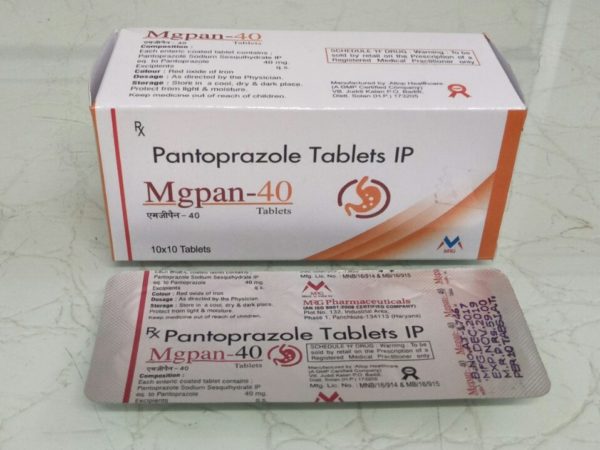MGPAN-40
COMPOSITION: PANTOPRAZOLE 40 MG
- Reviews (0)
- Indications
- Product Description
Be the first to review “MGPAN-40”
Short-term treatment (7 to 10 days) of patients with gastroesophageal reflux disease (GERD) who have a history of irritation of the esophagus. It may be used for conditions that cause your body to make too much stomach acid (eg, Zollinger-Ellison syndrome).
Pantoprazole is a proton pump inhibitor drug used for short-term treatment of erosion and ulceration of the esophagus caused by gastroesophageal reflux disease. Initial treatment is generally of eight weeks' duration, after which another eight week course of treatment may be considered if necessary. It can be used as a maintenance therapy for long term use after initial response is obtained.
Pantoprazole inhibits H /K ATPase pump function thereby reducing gastric acid secretion. It also has a role in the eradication of H. pylori.
Absorption
Well absorbed; peak plasma concentrations: Approx 2-2.5 hr after oral dose. Oral bioavailability: Approx 77% with enteric-coated formulation (does not vary after single or multiple doses).
Distribution
Protein-binding: 98%; volume of distribution: 11-24 L.
Metabolism
Hepatic; mainly by cytochrome CYP2C19 and slightly by CYP2D6 and CYP2C0.
Excretion
Via urine (approx 80%) and bile (approx 20%). Elimination half life: approx 1 hour (prolonged in hepatic impairment; in patients with cirrhosis the elimination half life may be 3-10 hours).
Diarrhoea, dizziness, pruritus, skin rashes, GI tract infections, chest pain, headache, nausea, pain, anxiety, hyperglycaemia; malaise or lassitude; myalgia; oedema; insomnia; hyperlipidaemia; flatulence, abdominal pain, constipation, eructation, dyspepsia, rectal disorder; urinary frequency, UTI; abnormalities in liver function; local site reaction; hypertonia, neck pain, weakness; bronchitis, cough, dyspnoea, pharyngitis, rhinitis, sinusitis, upper respiratory tract infection, flu syndrome.
Long-term therapy may lead to bacterial overgrowth in the GI tract. Hepatic impairment; monitor liver function regularly (if enzymes increase, discontinue); pregnancy; not recommended in children <18 yr; long term use may lead to atrophic gastritis.






Reviews
There are no reviews yet.